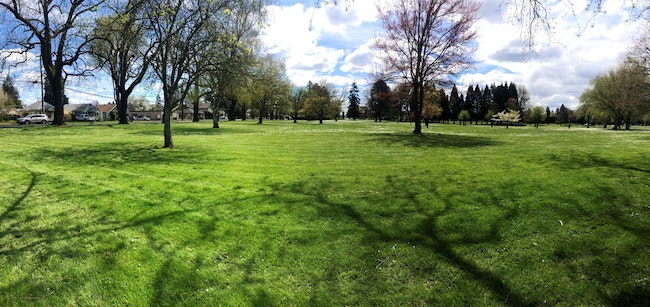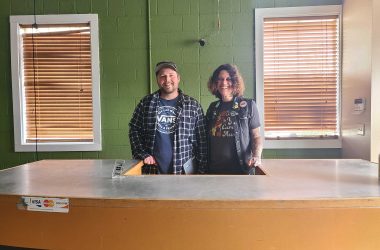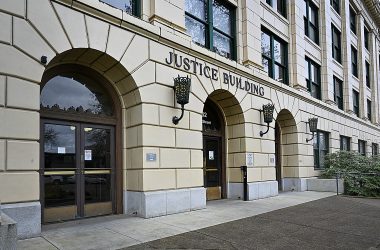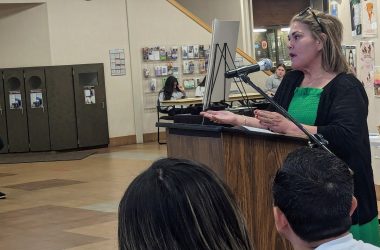 The Oregon State Hospital North Campus property, pictured in April. A piece of the project would give the city of Salem a former residence hall for nurses to be turned into 52 units of affordable housing. (Troy Brynelson/Salem Reporter)
The Oregon State Hospital North Campus property, pictured in April. A piece of the project would give the city of Salem a former residence hall for nurses to be turned into 52 units of affordable housing. (Troy Brynelson/Salem Reporter)
Salem’s plans to remodel Yaquina Hall, a former residence hall for nurses, into 52 affordable apartments have not moved beyond blueprints for nearly three years.
But now there appears to be movement. Delays by the state of Oregon recently prompted a frustrated letter from Mayor Chuck Bennett, where he blamed the state for taking too long to get the property sold to the city.
The city expected to buy it in 2018 and have it renovated by early 2019. Now the project may not house anyone for another two years. Meantime, the project has gotten nearly twice as expensive.
“We have been prepared to buy Yaquina Hall and bring much needed affordable housing to the city of Salem for three years, but have so far been unable to deliver on this goal due to multiple delays by (the state),” Bennett wrote.
Katy Coba, director of the state Department of Administrative Services, responded on Dec. 31 saying she understood the frustrations.
“Like you, we expected to be ready to close on transactions in late 2017,” Coba wrote. “No part of the process has progressed as we had anticipated.”
Salem has spent $775,000 on the project since December 2016, according to Nicole Utz, administrator for Salem Housing Authority. The city has also watched a $600,000 federal tax credit expire while waiting.
“We’ve been ready to go for a long time,” Utz said. “There’s a serious lack of one-bedroom availability in Salem to get those most in need off the streets and into a home.”
About 1,800 people in Marion and Polk counties are unsheltered, according to homeless services providers, with many living in cars or outdoors.
And, thanks to a booming economy, construction workers are so in demand nationwide that costs rise every day. But inflation’s impact on the project cost isn’t clear.
So what’s the hold up?
Development limbo
Salem and the state signed an agreement in December 2016, but the city can’t finish the deal until the state hurdles a few more stages of planning.
The state mainly needs to carve up the 47-acre lot of the north campus of the Oregon State Hospital, where Yaquina Hall stands, into smaller lots. Those lots will be turned into Yaquina Hall, a future park, and a private housing development.
But the property today remains a big block.
In his letter, Bennett blamed the state for taking years to get started. He said state officials took an entire year to “realize” they needed to hire engineers to subdivide the property.
The state started seeking engineers in “early 2018,” according to Liz Craig, of the state Department of Administrative Services. The agency ultimately hired the firm Mackenzie in August 2018.
Coba, in her letter, acknowledged the state didn’t move quick enough.
“We apologize for the delay this has caused,” Coba wrote.
The state’s timeline stalled another three months when it realized it hadn’t consulted with Native American tribes to examine the grounds, a standard practice to ensure lost artifacts and gravesites are recovered.
With that work done, city officials now await the state to break the parcel into pieces. Before that can occur, the state has to widen some of the roads, add sewer lines and more.
On three occasions last year, the state’s engineers submitted applications to start that work, according to permit records. Each time, city planners found the engineers’ applications incomplete.
“As of the date of this letter, a complete subdivision (plan) has still not been submitted,” Bennett wrote. “Nor have the street improvements, which are necessary for the Yaquina project to move forward and as agreed by the parties, been completed.”
Glenn Davis, the city’s chief development engineer, said the whole process has taken unusually long.
“From December 2016, the fact that it’s now January of 2020, that is longer than normal,” Davis said. However, he noted incomplete applications do happen regularly, though they don’t always take so long to resolve.
According to city records, Mackenzie submitted a fourth application on Dec. 23 that city planners are currently reviewing.
A Mackenzie official said that on a project involving local and state governments, as well as private developers who also want parcels, delays aren’t out of the ordinary.
“All teams involved have taken great care in ensuring the multiple sets of projects meet future city improvement plans while each continues to evolve,” said Matt Butts, who is working on the subdivision plans for the firm.
Still, costs are rising.
A patchwork of public money
Budget documents obtained by Salem Reporter show estimators in April 2017 pegged the cost to renovate Yaquina at $7.8 million. By November 2019, that rose to $13 million.
The rise isn’t entirely due to inflation, according to Utz, the city’s housing administrator. While inflation has “snowballed,” she said the planned renovations added pieces that make the project more expensive. Utz couldn’t say specifically how much inflation has pushed the price tag.
Some expenses so far have had to be duplicated because of the delays. According to Utz, the Salem Housing Authority has twice done environmental analyses on the project. Both have expired, making yet another necessary to meet legal requirements.
“I have to get them re-done,” Utz said. “I’m going to have to pay that out-of-pocket, out of housing authority money, in order to get this. We’re not willing to do that until they can give us a subdivision.”
Similarly, the housing authority contracted a firm in May 2017 to work with construction crews expected to be at work. The agency has paid the firm $92,901 to date and recently stopped paying until the state finishes the subdivision.
“We’re in a holding pattern, unfortunately,” Utz said.
The majority of money to pay for Yaquina Hall’s renovation does not come from Salem taxpayer but instead a patchwork of local, state and federal programs.
Bennett, in his letter, said the state’s delays are putting that money in jeopardy. Many grants providing that money expire.
“Given the housing crisis in Salem and the state and the importance of housing and homelessness as a statewide priority, it is unacceptable that this process should take this long,” Bennett wrote.
To remedy, Bennett called on Coba to give the Yaquina property to the city for free, instead of the nearly $400,000 price, and to throw in another $1.8 million to offset rising costs.
Coba, in her response, agreed to give the property for free. She said the two will work together to ask the state Legislature for the $1.8 million.
“I appreciate the strong working relationship that we have had with the city and I apologize for the frustration around this project,” Coba wrote. “I look forward to our continued work together, especially as the city works to increase the supply of affordable housing in Salem.”
Have a tip? Contact reporter Troy Brynelson at 503-575-9930, [email protected] or @TroyWB.









